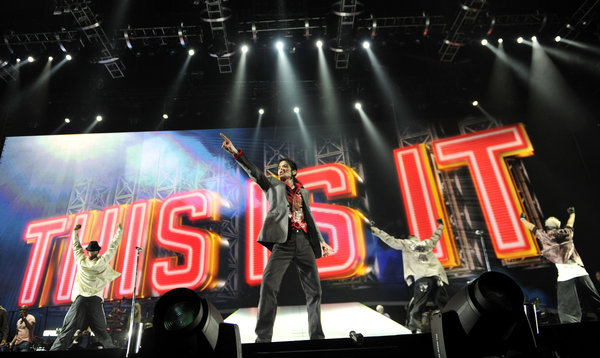Michael Jackson’s This Is It tour director Kenny Ortega was worried that Michael Jackson might not be able to pull off the tour.
This Is It director, Kenny Ortega testified in the wrongful death suit that Michael Jackson’s Mother and three children have brought against concern promoter and producer AEG Live.
Kenny Ortega testified that he was worried, “that all that we had worked for, Michael and I, this dream, this goal he and I had, this desire, was going to fall away”.
Kenny was also had “serious concerns” whether the “This Is It” tour could go on.
Ortega said that after he raised concerns about the singer’s absences, it was decided that AEG Live Chief Executive Randy Phillips and Jackson’s doctor, Conrad Murray, would be in charge of the star’s scheduling.
“Have you ever seen a situation where a CEO of a promoter and producer and a physician were responsible for an artist’s rehearsal and attendance schedule?” Jackson family attorney Brian Panish asked.
“No,” Ortega replied.
The jury was shown an email written by tour accountant Tim Woolley on June 23, 2009, two days before Jackson died of an overdose of the anesthetic propofol that Murray administered. The email said, “Kenny Ortega has responsibility only for the show content & structure in consultation with MJ. Randy Phillips and Dr. Murray are responsible for MJ‘s rehearsal and attendance schedule.”
The director said he just wanted Jackson to show up to rehearse with the dancers, singers, musicians and the rest of the crew preparing for the 50 concerts at the 02 Arena in London. “At a certain point it became my No. 1 goal,” he said.
Ortega had worked with Jackson before, serving as co-director of his “Dangerous” tour in the early 1990s, which ended abruptly when Elizabeth Taylor flew to Mexico City to accompany the entertainer to rehab in England. Ortega, who began his testimony Monday, called Jackson “the greatest performer on the planet as far as I was concerned. The greatest song-and-dance man ever.”
Before he started testifying, Ortega walked over to greet Michael’s mother, Katherine Jackson, who was in her customary seat in the front row of the spectators section of the small downtown Los Angeles courtroom.
Even before he arrived in the courtroom, Ortega has played a role in the trial through his emails describing Jackson’s frail physical and mental health that have been presented to the jury numerous times.
“There are strong signs of paranoia, anxiety and obsessive-like behavior,” he wrote to Phillips five days before Jackson’s death. “I think the very best thing we can do is get a top psychiatrist in to evaluate him ASAP. I honestly felt if I had encouraged or allowed him on stage last night he could have hurt himself. I believe we need professional guidance in this matter.”
Ortega is sure to be asked about the emails when he continues testifying Wednesday.
Panish showed the director records that there were 13 phone calls between Ortega and Murray on June 19, six days before Jackson died. “I remember that day,” Ortega said. Jackson showed up several hours late for a costume fitting and was cold and shivering, Ortega testified. He said that about that time, Jackson was complaining of back pain, slow at “growing into the show,” losing weight and his balance seemed off.
Ortega said he phoned Murray out of frustration that the star of the show was not coming to rehearsal and that the schedule wasn’t working. He said it was fair to call his actions a cry for help. “It’s not beyond how I would have described the call,” he said.
The director said he was working on the concerts for some time without a contract with AEG, which he finally signed on April 25, 2009. The contract would have paid him $1.5 million plus bonuses if Jackson took the tour elsewhere after the London dates.
He said he was paid for the work he performed before the deal was consummated. That is a key point for the Jacksons. Murray signed his contract the day before Jackson died, although he had been working as the singer’s doctor well before then. AEG never signed the contract, and Murray was never paid.
The Jacksons say in their lawsuit that AEG negligently hired and controlled Murray, pushing him to get Jackson on stage. AEG says that Jackson hired the doctor and that any money it was supposed to pay Murray was an advance that the singer would have had to pay back.
 Thfire.com Everyday news that matters
Thfire.com Everyday news that matters 
